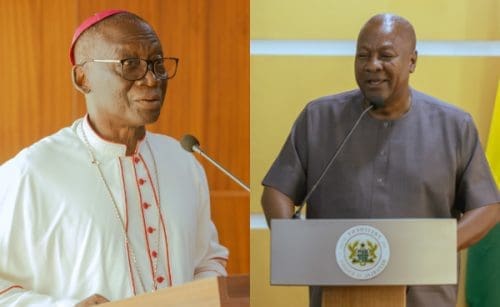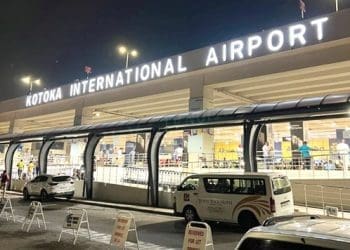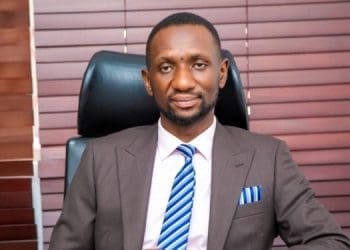The Ghana Catholic Bishops’ Conference has renewed its appeal to President John Dramani Mahama to immediately declare a state of emergency in the country’s worst-affected mining zones and around endangered water bodies, warning that the galamsey menace has become a threat to Ghana’s very survival.
The Bishops insist that the destruction caused by illegal and unregulated mining can no longer be addressed through half-hearted interventions but requires extraordinary measures that include curfews in volatile areas, the reclamation of devastated lands, the dismantling of entrenched criminal syndicates, and the uprooting of corrupt administrative complicities.
In a strongly worded statement signed by Most Rev. Matthew Kwasi Gyamfi, Bishop of Sunyani and President of the Ghana Catholic Bishops’ Conference, the leaders of the Church described the scale of devastation as nothing short of a national calamity. They emphasised that while a declaration of emergency is urgent, it must also be accompanied by a holistic, integrated national strategy that restores both the environment and the moral fibre of the nation.
This is a national emergency, not routine challenge
The Bishops described illegal mining, commonly known as galamsey, as one of the gravest afflictions of modern Ghana, insisting that it is not a routine challenge to be managed with piecemeal approaches but a national emergency requiring decisive action.
They drew on scripture to remind Ghanaians of humanity’s sacred responsibility as stewards of the earth, recalling the biblical charge in Genesis 2:15 that humanity was placed in the Garden of Eden “to till it and keep it.”
Instead of honouring that trust, the Bishops said, Ghanaians have turned rivers, forests, and farmlands into barren wastelands. Once-pristine rivers such as the Pra, Ankobra, Birim, Offin, and Ayensu are now laced with mercury and other toxic effluents, some unable to flow downstream, while others like the Ayensu record turbidity levels so extreme that they defy purification. Lands that once supported thriving forests and fertile farms now lie stripped bare, punctured with deadly pits and rendered sterile. Quoting Psalm 24:1, the Bishops lamented that “the earth is the Lord’s and all that is in it,” warning that to desecrate creation through reckless mining is not merely an offence against one’s neighbour but a grave sin against God Himself.
Livelihoods destroyed, health endangered
The statement drew attention to the far-reaching consequences of galamsey on livelihoods and public health.
Farmers, they noted, can no longer depend on the land to feed their families, while the Ghana Water Company spends heavily to render water barely potable.
Even then, traces of mercury, arsenic, cyanide, and chlorine persist in what is supplied to homes.

Children in mining communities abandon classrooms to chase quick riches in perilous pits, often at the cost of their lives when mine collapses occur.
The Bishops further warned that toxins from galamsey seep silently into Ghana’s food chain, triggering cancers, kidney failure, neurological disorders, and a host of other diseases.
They echoed the prophetic words of Pope Francis in his encyclical Laudato Si’, which describes the earth as “among the most abandoned and maltreated of our poor,” groaning under the weight of human exploitation.
Galamsey as a cancer in politics and governance
The Bishops did not shy away from indicting Ghana’s political and social institutions.
They described galamsey as a cancer that corrodes politics, governance, and conscience, pointing out that politicians, Members of Parliament, Municipal and District Chief Executives, chiefs, religious leaders, and even elements within the security services have been implicated in shielding illegal operators for personal gain.
“This betrayal of trust cuts to the very marrow of our national identity,” the statement said, urging such leaders to repent without delay.
The Bishops warned that the crisis has matured into a serious national security threat, enriching criminal cartels, breeding lawlessness, and fomenting violent conflicts in mining communities.
President Mahama’s “unsatisfactory response”
What deeply troubled the Bishops was what they described as President Mahama’s failure to grasp the existential scale of the menace.
They revealed that they had met the President in January and May this year to raise their concerns directly, only to be met with unsatisfactory responses focused narrowly on economic considerations.
At his “Meet the Press” session on September 10, the President dismissed calls for a state of emergency, a decision the Bishops described as profoundly troubling.
“The hour is late. Delay is betrayal. Now, not tomorrow, not later, is the time to act,” the Bishops insisted, warning that further hesitation risks compounding the damage to the nation’s environment, society, and moral standing.
Proposals for a lasting solution
In their statement, the Bishops outlined several measures that they believe are necessary for Ghana to reverse the crisis.
They called for mining laws to be revised, sharpened, and strictly enforced with stiffer penalties for offenders.
They demanded the establishment of specialised courts to expedite prosecutions and the creation of a permanent, corruption-proof task force comprising security agencies, environmental experts, and local authorities to ensure enforcement beyond the short-lived crackdowns that have characterised past efforts.
They also emphasised that justice must be tempered with mercy. Many young people, they acknowledged, are driven into galamsey by desperation and must therefore be offered sustainable alternatives.
Properly regulated small-scale mining zones, fortified with environmental safeguards and technical support, could offer one pathway.
At the same time, displaced farmers should be supported with land, credit, and training to restore their livelihoods, while a nationwide afforestation and reclamation programme should be launched to heal the scars of destruction and provide dignified employment, particularly for the youth.
A call for national repentance
The Bishops’ statement ended with a stirring appeal to all Ghanaians to rise to their responsibilities.
They urged chiefs to remember their sacred role as custodians of the land, politicians to place Ghana above personal and partisan advantage, religious leaders to speak prophetically without fear or favour, and security agencies to act with integrity as defenders of the people rather than accomplices in their betrayal.
“To all Ghanaians, we say: resist the lure of quick wealth that leaves our children a desert in place of a homeland,” the Bishops declared.
“This struggle is not merely about law enforcement. It concerns the very soul of Ghana. It is about whether we choose life or death, blessing or curse.”
With scripture as their guide, they urged the nation to choose life—for present generations and for those yet unborn. “May the Lord bless our homeland Ghana,” they concluded, “and make us faithful stewards of His creation.”













